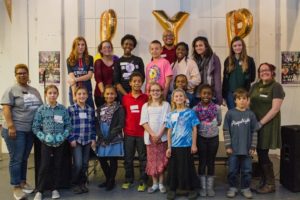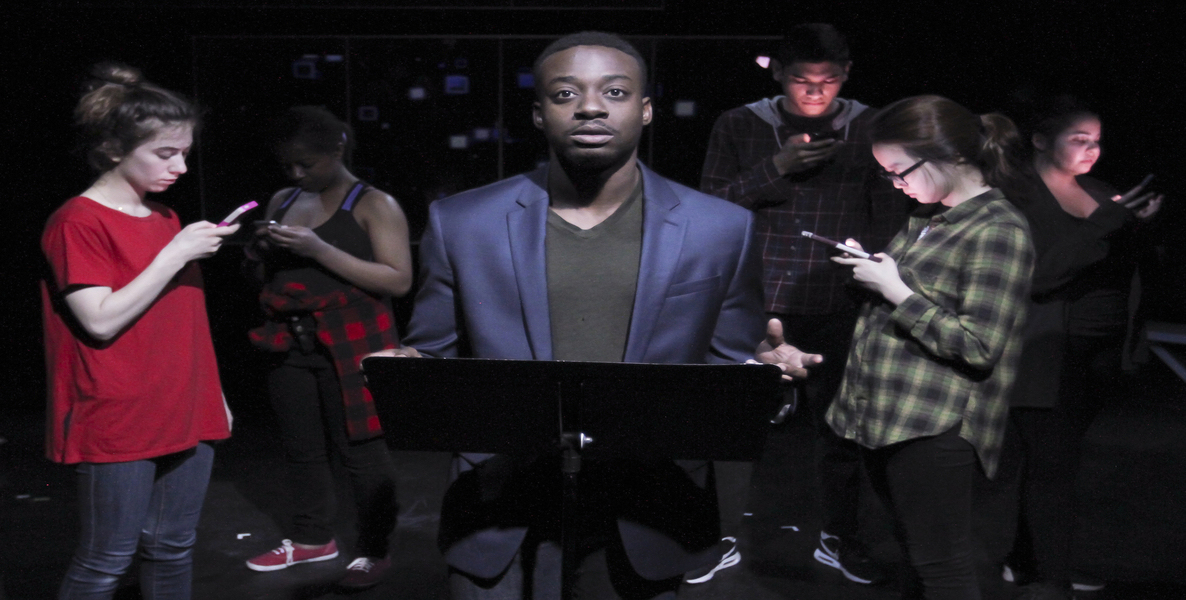It’s remarkable how quiet the fifth graders are at Grover Washington Middle School in North Philadelphia while the performers are doing their thing. The kids pipe up from time to time, but the man on stage, the director, calms them down easily, with just a waggle of his fingers. There is a round of applause every two minutes, because the plays being presented are bite-sized, just like the people who wrote them.
They’re the Grover Washington branch of the Philadelphia Young Playwrights, which for three decades has brought drama training to Philly schools, providing a much-needed shot of arts education into a curriculum often too focused on tests. This is the fruit of their labor: A reading of their works by professional actors contracted by PYP. Michelle McQuade, a fifth grade teacher who works with the program, looks on with glee, only occasionally looking into the crowd of students to remind them to clap or give them that “shut up or I’ll call your mom” look.
McQuade has worked with PYP for about six years. She says that the kids are often taken in by the program because it fills something of a hole in their academic lives, and satiates their need for a creative outlet. From January to June, the students met every week to study what plays are and integrate them into the reading curriculum, getting pretty deep into what it takes to be a playwright.
“It’s a different type of environment, not teacher-student,” says McQuade. “PYP gets the kids to open up and think creatively. They talk about adding characters, expanding characters’ feelings, adding settings, problems and solutions.”
Grover Washington is just one of over 40 schools that works with PYP. In 2018, PYP celebrates its 30th anniversary and is expanding beyond the Philly stage. It’s working with groups in New York City and Boston to develop curricula. And this spring, it launched one of its most successful recent initiatives: A podcast called “Mouthful.”
Each 18 to 25 minute Mouthful episode opens up with a monologue written by a young playwright, or someone associated with PYP. The monologues themselves run the gamut of drama—funny, heartfelt, bitter and rousing—about issues that speak to the heart of being a young American today: Gender identity, eating disorders, community policing, jobs, social media.
It’s not your normal podcast, I’ll say that much. It’s a far classier production than most of the stuff that’s out there, the kind of thing you’d normally pick up through an NPR or New Yorker affiliate. Each 18 to 25 minute episode opens up with a monologue written by a young playwright, or someone associated with PYP. The monologues themselves run the gamut of drama—funny, heartfelt, bitter and rousing—about issues that speak to the heart of being a young American today: Gender identity, eating disorders, community policing, jobs, social media. Structurally, they’re masterful, and their delivery by PYP-contracted professional actors is superb. A grown creative type would be thrilled to see their work get such treatment.
Sometimes the stories are heartless, mercilessly sarcastic takes on modern culture. One monologue by Owen Fox, then a senior at Masterman high School, is told from the point of view of a young fast food restaurant worker. It’s a blistering takedown of not only junk food culture, but of crappy first jobs. “Yes, I understand that if you don’t get the US daily recommended dose of greasy burger meat everyday you’ll break out in hives, but hives are not really within my purview,” it starts. “Sir, I honestly recommend that you just lick the grease off the wrappers in the wrapper dispenser.” That’s followed by a parade of interviews with full-grown adults about the worst jobs they’ve ever had, and their meaning in the grand scheme of their lives.
Other times, the stories are brutally personal. The first episode in April began with a heartfelt, anger-infused take on being transgender, written by PYP participant Hunter in the 9th grade and read by by Scott Turner Schofield, a transgender activist/actor on The Bold and the Beautiful. “This type of frustration is the one that makes you want to trash your entire bedroom and tell all those assholes who promised you that they would listen and that they would care, and then they turn right around and tell you that you’re a liar and ask you stupid questions like, ‘How can you be something that you know nothing about?’” Hunter wrote. “You just want to scream at them and tell them to ‘Fuck off!’…You realize you can’t do anything about it so you just cry.”
One of the final episodes, in June, contains a painful, mournful monologue about a young woman coming to grips with the death of her brother, then rolls into an interesting discussion about sibling grief.
Heady stuff for teen writers.
PYP Executive Director Lisa Haynes says the podcast had over 5,600 individual downloads and more than 6,000 subscribers since it launched in April—an impressive metric for any new podcast. The first season of Mouthful has just wrapped up, with 11 episodes. PYP is set to start production on the second season shortly. ““The podcast is going gangbusters!” Haynes says.

Regardless of format, the goal of PYP has always been the same: To bring arts and drama programming to students who may not have it otherwise. Using a relatively small staff, they dispatch theater professionals to schools around the district, and have those professionals work with kids to teach them the basics of and foster an interest in theater.
And they get results: Some notable alums include Adam Goldberg—the guy who created and produces ABC’s hit comedy The Goldbergs—and Quiara Alegria Hudes, who wrote the book for the broadway smash musical In The Heights. This year’s combined Middle School and High School monologue competitions accrued more than 800 submissions; tens of thousands of kids across Philadelphia have participated in the program.
“At its core (PYP) is a literacy program, and remains close to the original vision of really supplementing and providing access to our program. Even when the organization was founded, the school district was struggling. They didn’t have the resources to bring an arts-based curriculum into the classroom. They were always struggling to have those extra resources for kids who don’t learn the way other kids do,” says Haynes.
“At its core PYP is a literacy program, and remains close to the original vision of really supplementing and providing access to our program. Even when the organization was founded, the school district was struggling. They didn’t have the resources to bring an arts-based curriculum into the classroom. They were always struggling to have those extra resources for kids who don’t learn the way other kids do,” says Haynes.
Indeed, PYP, which gets financial support from both the William Penn Foundation and the Independence Foundation, among others, goes above and beyond for kids who really take to the programming. They host two retreats throughout the year; in the summer, they hold playwriting camps, and their playwriting festivals, where plays are acted out by actors contracted by PYP.
It must be a thrill for the kids chosen; it’s kind of like if you were 15 and a fan of Madden, and the in-game playbook you made was scrimmaged out by the Philadelphia Soul. Seeing PYP act out their work stands to be something memorable and affirming for these kids who, as McQuade says, spend most of their academic time drilling for aptitude tests; it’s a chance for them to see their own hard work in action, even if it’s a one-scene play.
“We try to provide them with one on one access to dramaturgs, and give them support through peer reviews, and things like that. One thing that was really important to me was expanding our reach to the playwrights beyond the classroom,” says Haynes. “I wanted to show them that there are other students like them around the city and the county. So we started a group called the Resident Playwrights, to give these kids extra reviews and support.”
And this summer, PYP continues its summer programs, with camps lined up all across Philly, for pretty much every age group.
“They really love it,” says McQuade at Grover Washington. “I’ve had three or four kids who have said they’d maybe be playwrights when they grow up.”
Header Photo: Paola Noguera


